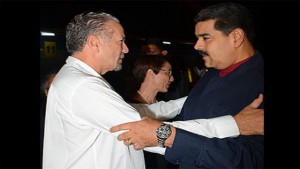 KINGSTON, Jamaica, Sunday May 22, 2016 – Amid the food, electricity and economic crisis in his country, Venezuelan president Nicolás Maduro arrived in Jamaica last night for what the government says is a one-day “working visit”, ahead of his trip to another Caribbean country where a demonstration is being planned.
KINGSTON, Jamaica, Sunday May 22, 2016 – Amid the food, electricity and economic crisis in his country, Venezuelan president Nicolás Maduro arrived in Jamaica last night for what the government says is a one-day “working visit”, ahead of his trip to another Caribbean country where a demonstration is being planned.
A Jamaica government statement said Maduro, who was met on his arrival at the Norman Manley International Airport in Kingston by Minister of Foreign Affairs and Foreign Trade, Senator Kamina Johnson Smith, and other dignitaries, is meeting with Prime Minister Andrew Holness and members of Cabinet today. Senator Johnson Smith said the visit is an important one, and she is expecting the bilateral meeting between the two leaders to be fruitful.
President Maduro last visited Jamaica in September last year, for the Summit to Commemorate the 10th Anniversary of the PetroCaribe Agreement, the 200th Anniversary of the Jamaica Letter, written by the Great Liberator Simon Bolivar in Kingston on 6th September 1815, and for the inauguration of the Simon Bolivar Cultural Centre in downtown Kingston. He leaves the island this afternoon and will head to Trinidad and Tobago.
The Newsday newspaper in the twin-island republic said Venezuelans living there planned to protest his visit. It quoted the organizer of the protest, Yesenia Gonzalez, as saying that up to 50 protestors will beat pots and pans outside the Diplomatic Centre during Maduro’s visit. “He should not come right now because Venezuela is going through a crisis,” Gonzalez told the newspaper. “What does Maduro have to offer TT?….Maduro is coming to TT with nothing.”
Minister in the Office of the Prime Minister, Stuart Young, said last week that the visit is for the continuation of the talks held between the two countries last October, and aims to enhance bilateral cooperation in the areas of foreign policy, energy and trade. He said the problems in Venezuela did not mean the discussions “should not continue”.
The oil-rich nation is facing one of its deepest financial crises ever, following the huge decline in global oil prices. There has been a shortage of not only staple foods, but also medicine, and last weekend a 60-day state of emergency went into effect.
